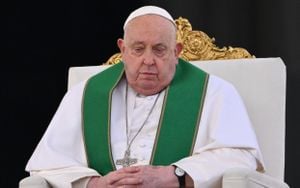With the German Federal Election 2025 just days away, the country's political leaders gathered for the final televised debates to present their views on pressing issues facing Germany and Europe. The debates, held on ARD and ZDF, saw representatives from various parties discussing diverse topics, particularly emphasizing security and defense amid shifting global political dynamics.
During the debate, prominent figures included Matthias Miersch, the SPD's General Secretary, alongside other top candidates from the CDU, CSU, Greens, FDP, AfD, and Left Party. The urgency of the topics at hand was heightened by recent events, especially concerning the conflict in Ukraine and the potential reevaluation of Europe's security posture.
SPD General Secretary Matthias Miersch emphasized the importance of reforming debt regulations to adequately fund Germany’s defense capabilities. "We must not pit national interests against the question of defense," he stated, acknowledging the financial sacrifices necessary to protect Germany's security. Both he and Foreign Minister Annalena Baerbock from the Greens highlighted the potential decline of U.S. support, noting the need for Europeans to take more responsibility for their own peace and security.
Contrasting Miersch's position, CDU Secretary Carsten Linnemann criticized the current government's handling of external threats, urging Germany to reclaim its leading role within Europe. "Germany must prioritize defense capacity," Linnemann declared, signaling the party's commitment to addressing external challenges more vigorously. He asserted, "The geopolitical strength of our nation has always depended on our economic strength, which we currently lack and must restore."
Meanwhile, the AfD's Alice Weidel took an opposing stance, arguing against any military engagement or financial support for Ukraine. Her remarks reflected the party's broader skepticism toward foreign entanglements, underlining the message of reduced involvement during conflict.
Other significant voices, such as BSW leader Sahra Wagenknecht, condemned what she termed as "a reckless arms race," advocating for the abandonment of increased military spending which she deemed unnecessary. Jan van Aken, from the Left Party, supported her views, criticizing the alignment toward NATO and urging for the promotion of European peace initiatives.
Healthcare and social welfare also emerged as pivotal discussion points during the debates. Miersch reiterated the SPD's commitment to introducing reforms to limit out-of-pocket healthcare costs, calling for the establishment of a fairer, more inclusive healthcare system. "Ending privileged appointment scheduling is one of our goals," he insisted, pointing to the need for equitable access across all demographics.
Conversely, Lindner maintained his party’s stance on preserving the dual healthcare system, rejecting calls for unification under public insurance. He articulated concerns about government overreach, stating, "A unitary healthcare system leads down the wrong path, stripping the freedom of choice from patients and providers."
The discussions delved deeply not only on health but also on the climate crisis, with goals for achieving net-zero greenhouse gas emissions by 2045 underscored by several leaders. Miersch welcomed the unanimous commitment from various parties to this goal, emphasizing its significance. The climate-focused dialogues drew attention to the necessity of investment to spur green technologies and sustainable practices.
The varying views on how to achieve these important societal aims brought forth animated exchanges among panelists. Baerbock, championing progressive environmental policies, stressed the innovative potential of green industry, remarking, "We have shown, through renewables, the possibility of steering our economy toward sustainability."
With the election date rapidly approaching, this final wave of debates aims to clarify party positions, allowing voters to weigh their options as they head to the polls. Despite the raucous discussions, many analysts will be watching closely to see if these exchanges can effectively persuade the undecided voters, who will play a pivotal role on election day.
Throughout this election campaign, Matthias Miersch has positioned the SPD as the party focused on supporting the lower-income classes and ensuring social equity. "We want to alleviate the burden on those who have less, and ask the super-rich for more contributions," he articulated during the Wetzlar SPD gathering earlier this week. Miersch stressed the need for greater investment, warning, "Not everything was preferable in the past, but we can’t continue to live off of our reserves without addressing growing societal issues."
Indeed, Miersch cautioned against allowing hostilities or misinformation to dictate the narrative surrounding the election, asserting, "A resilient democracy must be fortified against outside influences, particularly as online discourse becomes increasingly polarized." A clear call to action was reiterated as local leaders urged citizens to fulfill their civic duties by voting, urging participation beyond party alignment.
Against the backdrop of these high-stakes discussions, the German populace finds itself at the crossroads of decision-making, pondering the future direction of their country as seasoned politicians vie for their support.



